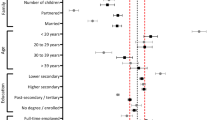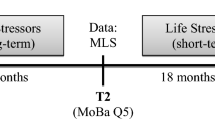Abstract
Little is known about the long-term impact ofreproductive experiences on women's lives. This paperuses questionnaire data collected from 107 white femalecollege graduates, when they were approximately 47 years old. More than half the sample hadexperienced at least one type of reproductive difficulty(abortion, miscarriage, or infertility). The stress andcoping model of life difficulties (Lazarus &Folkman, 1984) was used to examine the relationshipbetween the women's reproductive difficulties andemotional sequelae, politicization, and orientation tomotherhood at midlife. As predicted, emotional responses to the reproductive difficulties variedaccording to the particular nature of each experience.In addition, women who had abortions and no otherdifficulties were more politicized at midlife than other women. Women whose reproductive experienceswere especially likely to arouse feelings of not beingin control of their life (those who had miscarriages orinfertility) described a more agentic orientation to motherhood when compared with other women.
Similar content being viewed by others
REFERENCES
Adler, N. E. (1975). Emotional responses of women following therapeutic abortion. American Journal of Orthopsychiatry, 45,446–454.
Adler, N. E., David, H. P., Major, B. N., Roth, S. H., Russo, N. F., & Wyatt, G. E. (1992). Psychological factors in abortion. American Psychologist, 47,1194–1204.
Afek, D. (1990). Sarah and the women's movement: The experience of infertility. Women and Therapy, 10, 195–203.
Cole, E. R., & Stewart, A. J. (1996). Meanings of political participation among black and white women: Political identity and social responsibility. Journal of Personality and Social Psychology, 71, 130–140.
Collins, P. H. (1987). The meaning ofmotherhood in black culture and black mother/daughter relationships. In J. Wetzel, M. L. Espenlaub, M. A. Hagen, A. B. McElhiney, & C. B. Williams (Eds.), Women's studies: Thinking women. Dubuque, IA: Kendall/Hunt.
Connolly, K. J., Edelmann, R. J., Cooke, I. D., & Robson, J. (1992). The impact of infertility on psychological functioning. Journal of Psychosomatic Research, 36, 459–468.
Erikson, E. H. (1968). Womanhood and the inner space. In J. Strouse (Ed.), Women & analysis. New York: Grossman Publishers.
Folkman, S. (1984). Personal control and stress and coping processes: A theoretical analysis. Journal of Personality and Social Psychology, 46, 839–852.
Forrest, L., & Gilbert, M. S. (1992). Infertility: An unanticipated and prolonged life crisis. Journal of Mental Health Counseling, 14, 42–58.
Freud, S. (1933/1965). Femininity. In New introductory lectures on psychoanalysis. New York: W. W. Norton.
Frost,M., & Condon, J. T. (1996). The psychological sequelae ofmiscarriage: A critical review of the literature. Australian and New Zealand Journal of Psychiatry, 30, 54–62.
Gold-Steinberg, S. E. (1991). Legal and illegal abortion: Coping with the impact of social policies on women's lives. Unpublished doctoral dissertation, University of Michigan, Ann Arbor.
Gurin, P., Miller, A., & Gurin, G. (1980). Stratum identification and consciousness. Social Psychology Quarterly, 43, 30–47.
Hare-Mustin, R. T., & Broderick, P. C. (1979). The myth of motherhood:A study of attitudes toward motherhood. Psychology of Women Quarterly, 4, 114–128.
Hobfoll, S. E., & Lerman, M. (1988). Personal relationships, personal attributes, and stress resistance: Mothers' reactions to their child's illness. American Journal of Community Psychology, 16, 565–589.
Hobfoll, S. E., Nadler, A., & Leiberman, J. (1986). Satisfaction with social support during crisis: Intimacy and self-esteem as critical determinants. Journal of Personality and Social Psychology, 51, 296–304.
Janoff-Bulman, R. (1989). Assumptive worlds and the stress of traumatic events: Applications of the schema construct. Social Cognition, 7, 113–136.
Janssen, H. J. E.M., Cuisinier, M. C. J., Hoogduin, K. A. L., & deGraauw, K. P. H.M. (1996). Controlled prospective study on the mental health of women following pregnancy loss. American Journal of Psychiatry, 153, 226–230.
Lazarus, R. S., & Folkman, S. (1984). Stress, appraisal, and coping. New York: Springer Publishing Company.
Lee, C., & Slade, P. (1996). Miscarriage as a traumatic event: A review of the literature and new implications for intervention. Journal of Psychosomatic Research, 40, 235–244.
Lykes, M. B. (1985). Gender and individualistic vs. collectivist bases for notions about the self. Journal of Personality, 53,356–383.
Major, B., Cozzarelli, C., Sciacchitano, A.M., Cooper, M. L., Testa,M., & Mueller, P. (1990). Perceived social support, self-efficacy, and adjustment to abortion. Journal of Personality and Social Psychology, 59, 452–463.
Major, B., Richards, C., Cooper, M. L., Cozzarelli, C., & Zubek, J. (1998). Personal resilience, cognitive appraisals, and coping:An integrative model of adjustment to abortion. Journal of Personality and Social Psychology, 74, 735–752.
Matthews, R., & Matthews, A.M. (1986). Infertility and involuntary childlessness: The transition to nonparenthood. Journal of Marriage and the Family, 48,641–649.
Miall, C. E. (1986). The stigma of involuntary childlessness. Social Problems, 33,268–282.
Neugebauer, R., Kline, J., Shrout, P., Skodol, A., O'Connor, P., Geller, P. A., Stein, Z., & Susser, M. (1997). Major depressive disorder in the six months after miscarriage. Journal of the American Medical Association, 277, 383–388.
Reinharz, S. (1988). What' s missing in miscarriage ? Journal of Community Psychology, 16, 84–103.
Rhodes, R. (1988). Women, motherhood, and infertility: The social and historical context. Journal of Social Work and Human Sexuality, 6, 5–20.
Russo, N. F. (1976). The motherhood mandate. Journal of Social Issues, 32,143–153.
Russo, N. F., & Zierk, K. L. (1992). Abortion, childbearing, and women' s well-being. Professional Psychology, 23, 269–280.
Sandelowski, M. J. (1990). Failures of volition: Female agency and infertility in historical perspective. Signs: Journal of Women in Culture and Society, 15, 475–499.
Stewart, A. J., & Gold-Steinberg, S. (1996). Women's abortion experiences as sources of political mobilization. In M. B. Lykes, A. Banuazizi, R. Liem, & M.Morris (Eds.),Myths about the powerless:Contesting social inequalities(pp. 275–295). Philadelphia,PA: Temple University Press.
Stewart, A. J., & Healy, J. M. (1989). Linking individual development and social changes. American Psychologist, 44,30–42.
Stewart, D. E., & Robinson, G. E. (1989). Infertility by choice or by nature. Canadian Journal of Psychiatry, 34, 866–871.
Tangri, S. S., & Jenkins, S. R. (1986). Stability and change in role innovation and life plans. Sex Roles, 14, 647–662.
Rights and permissions
About this article
Cite this article
Zucker, A.N. The Psychological Impact of Reproductive Difficulties on Women's Lives. Sex Roles 40, 767–786 (1999). https://doi.org/10.1023/A:1018812819260
Issue Date:
DOI: https://doi.org/10.1023/A:1018812819260




